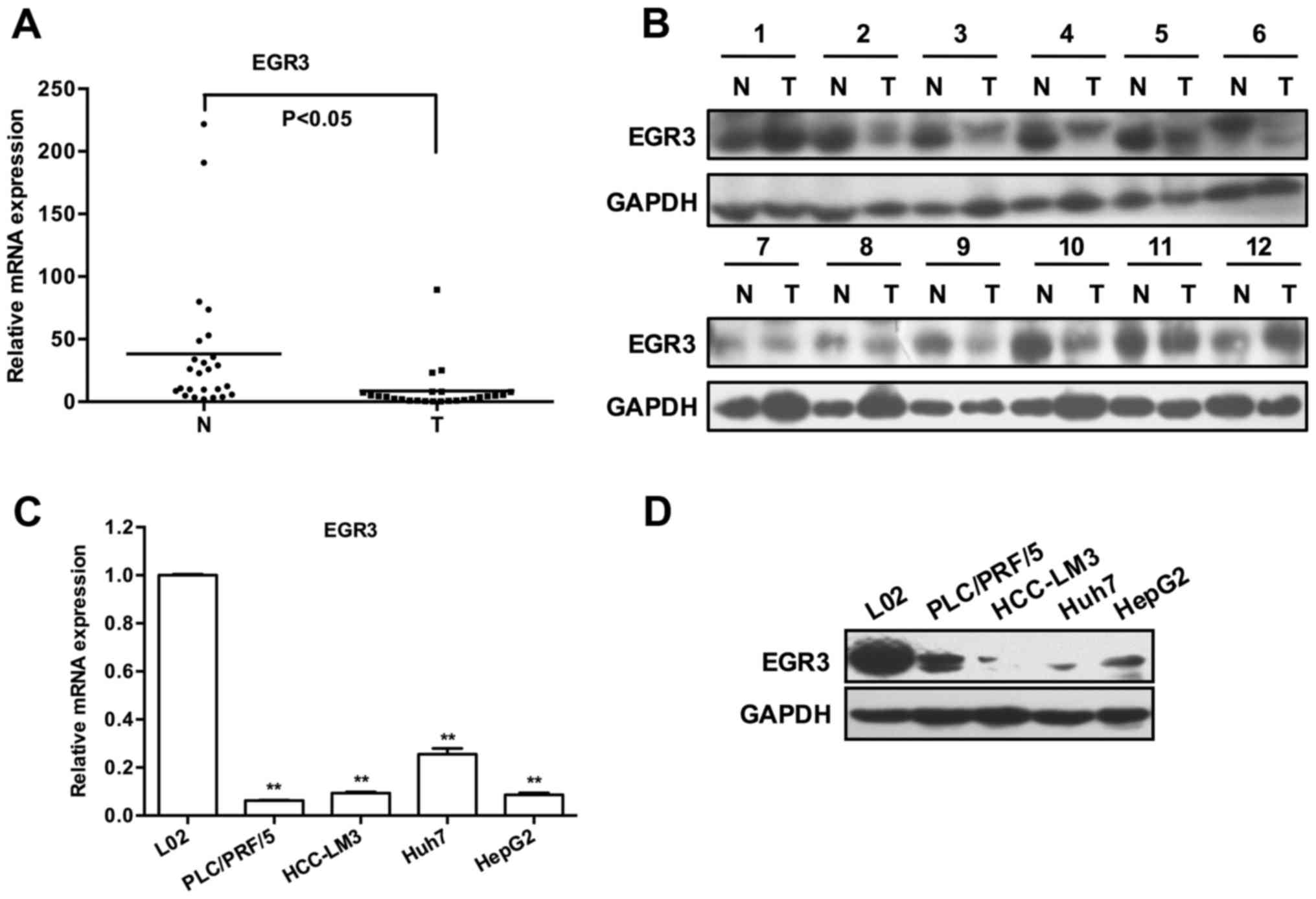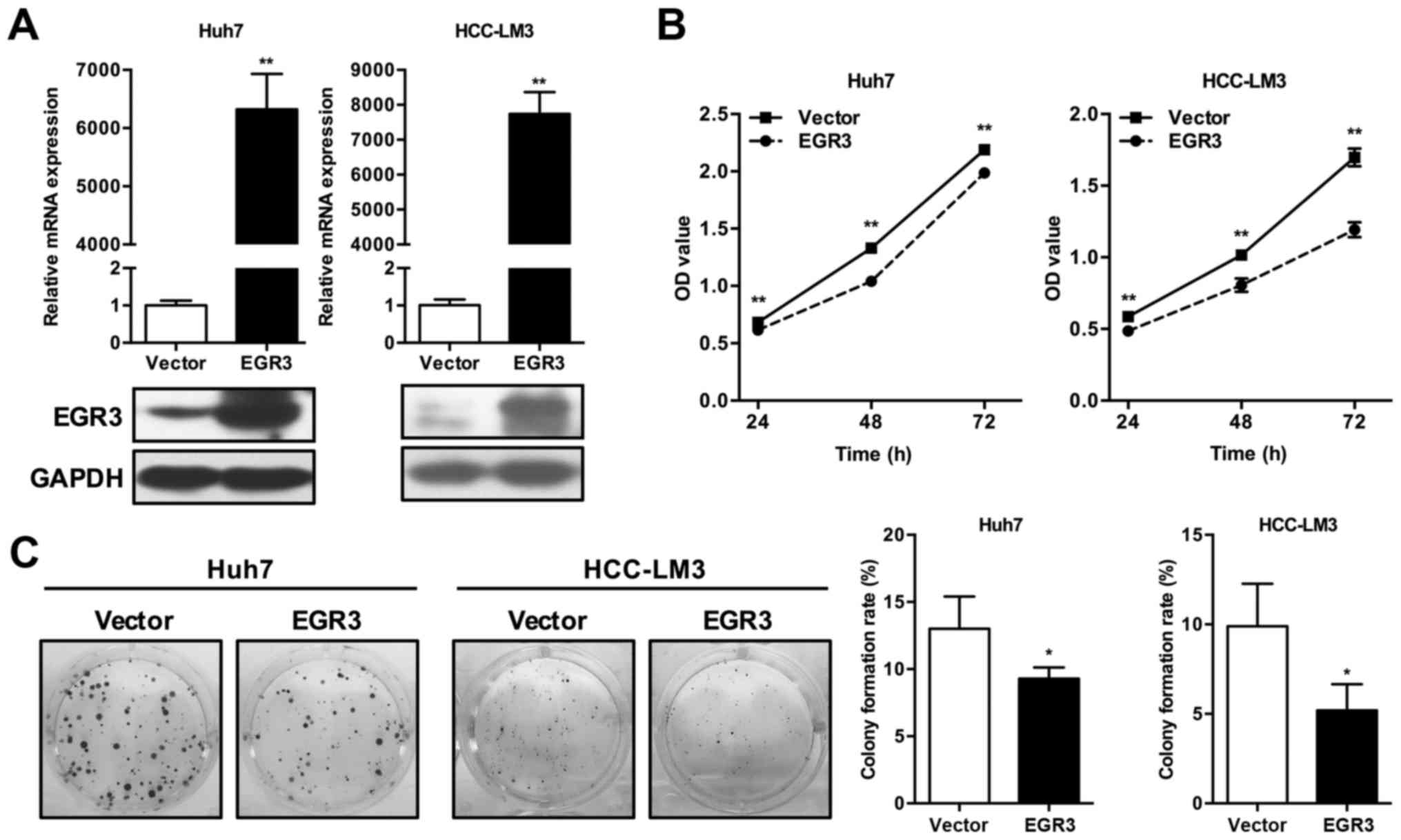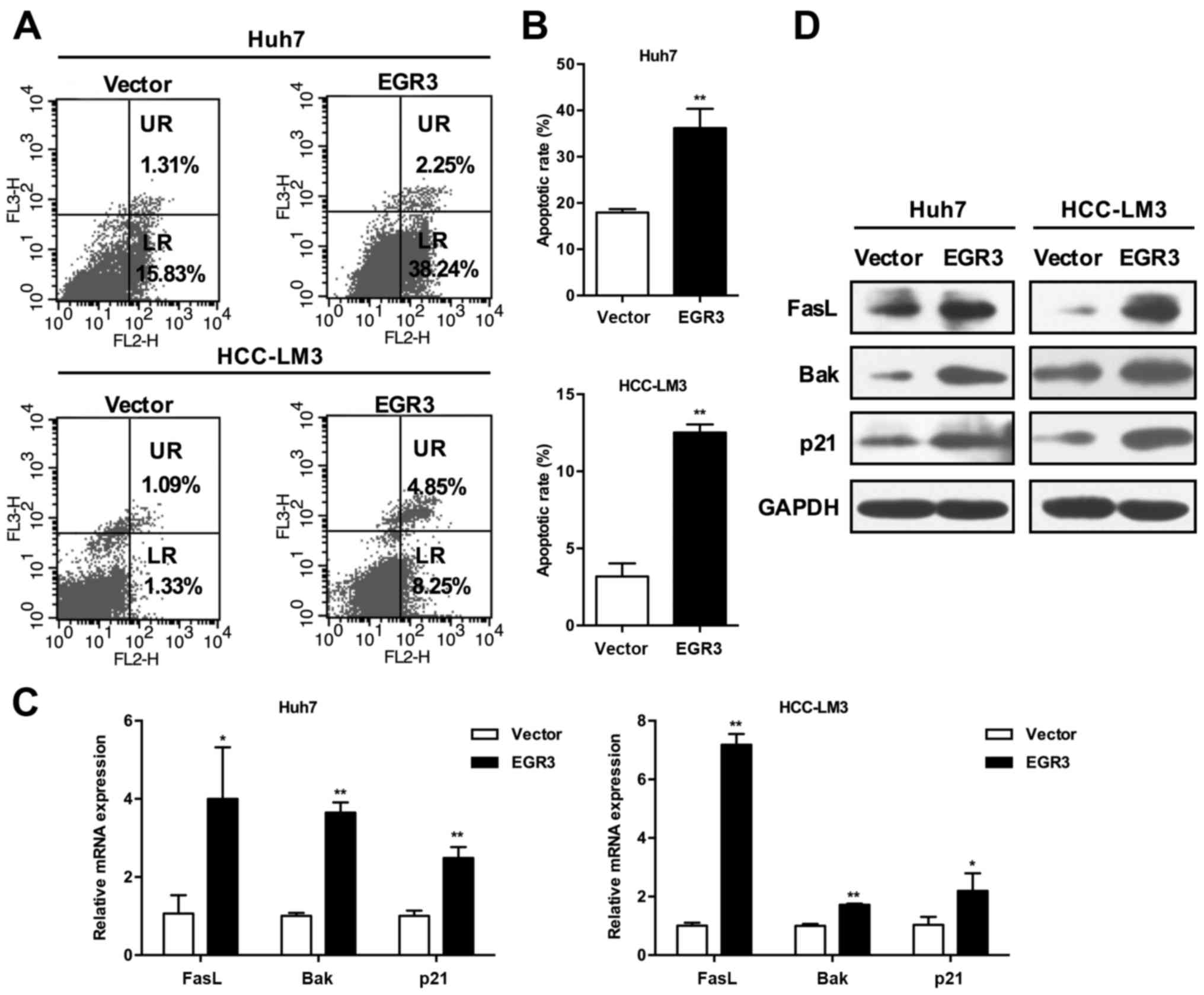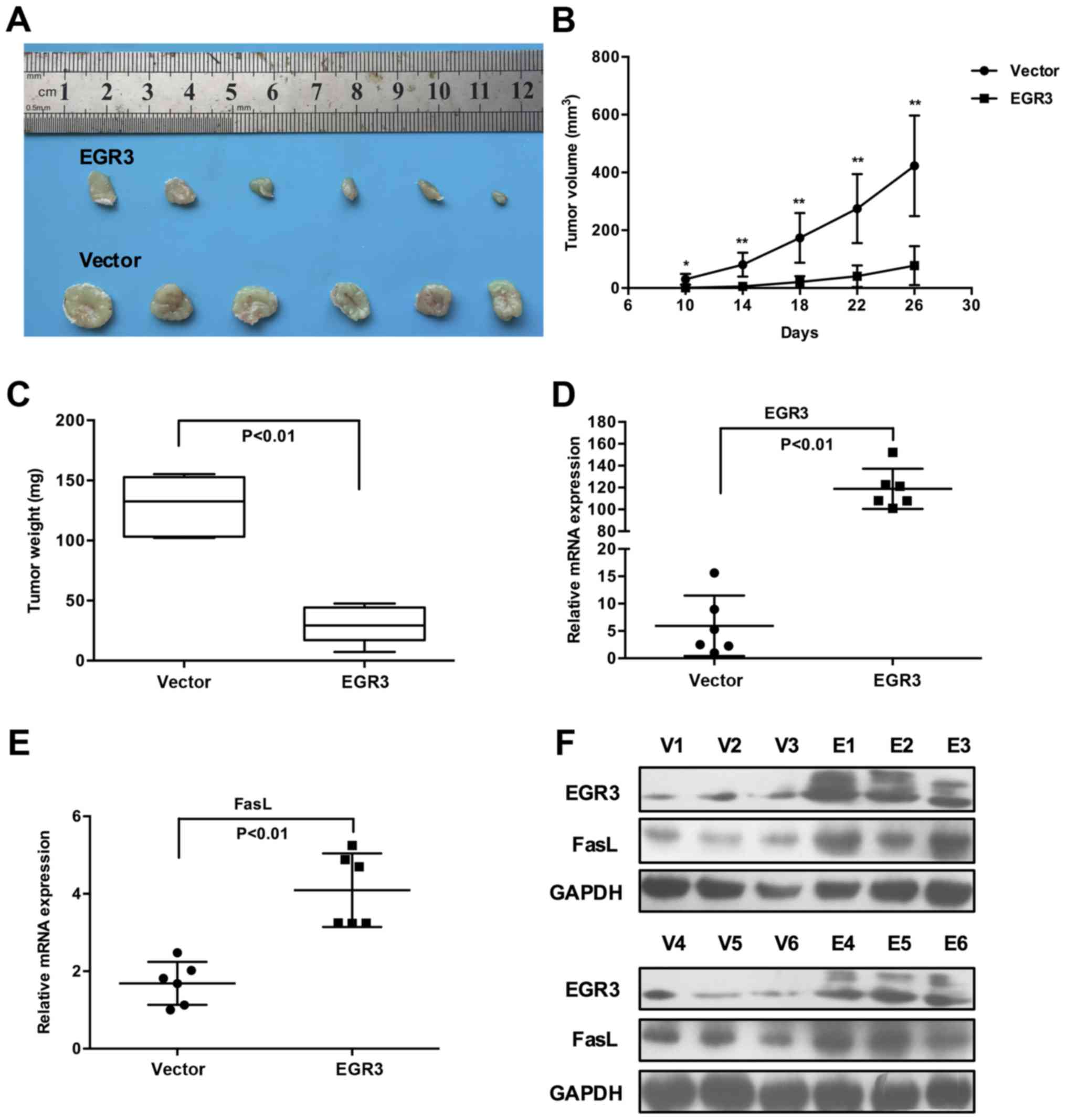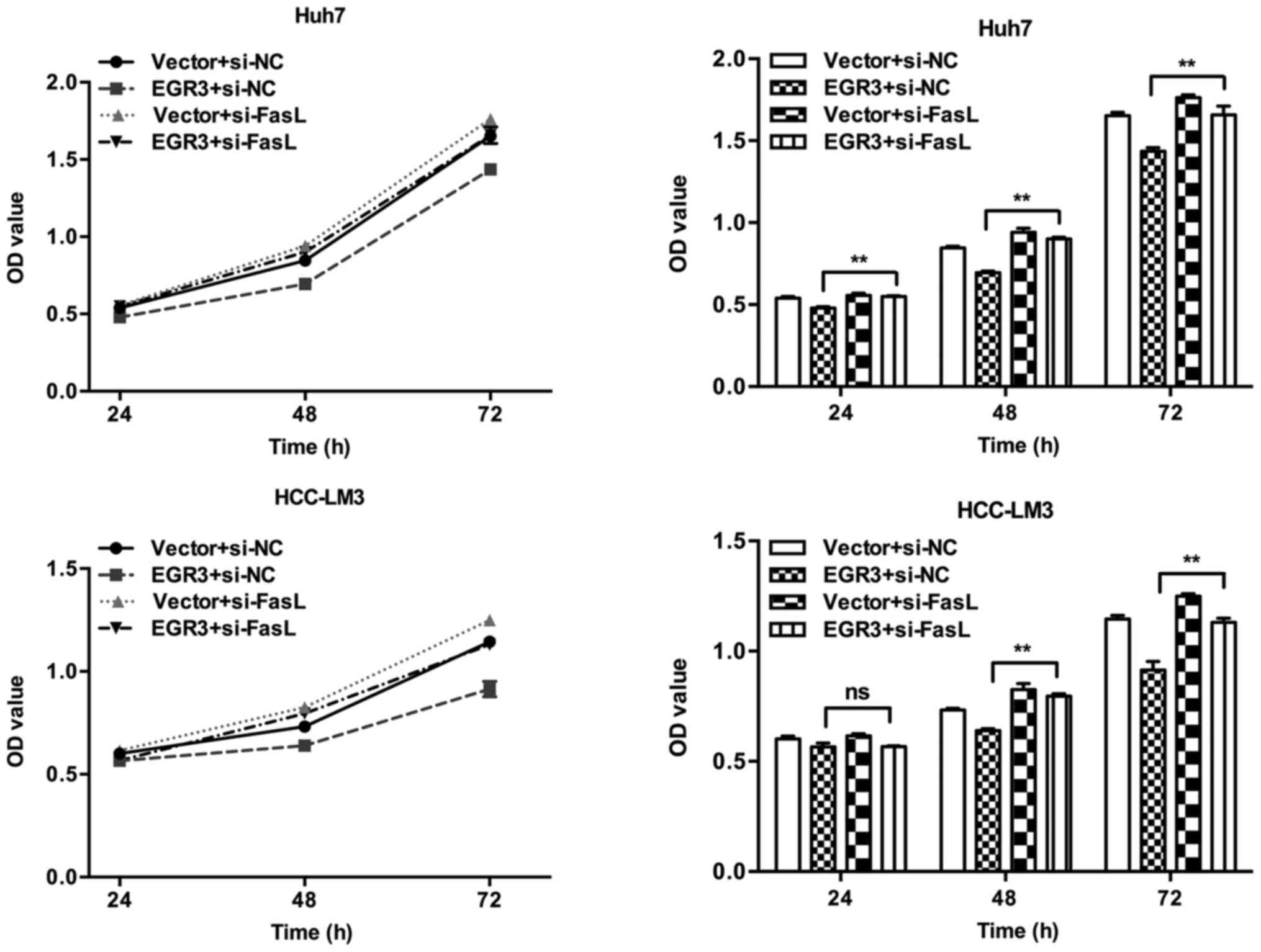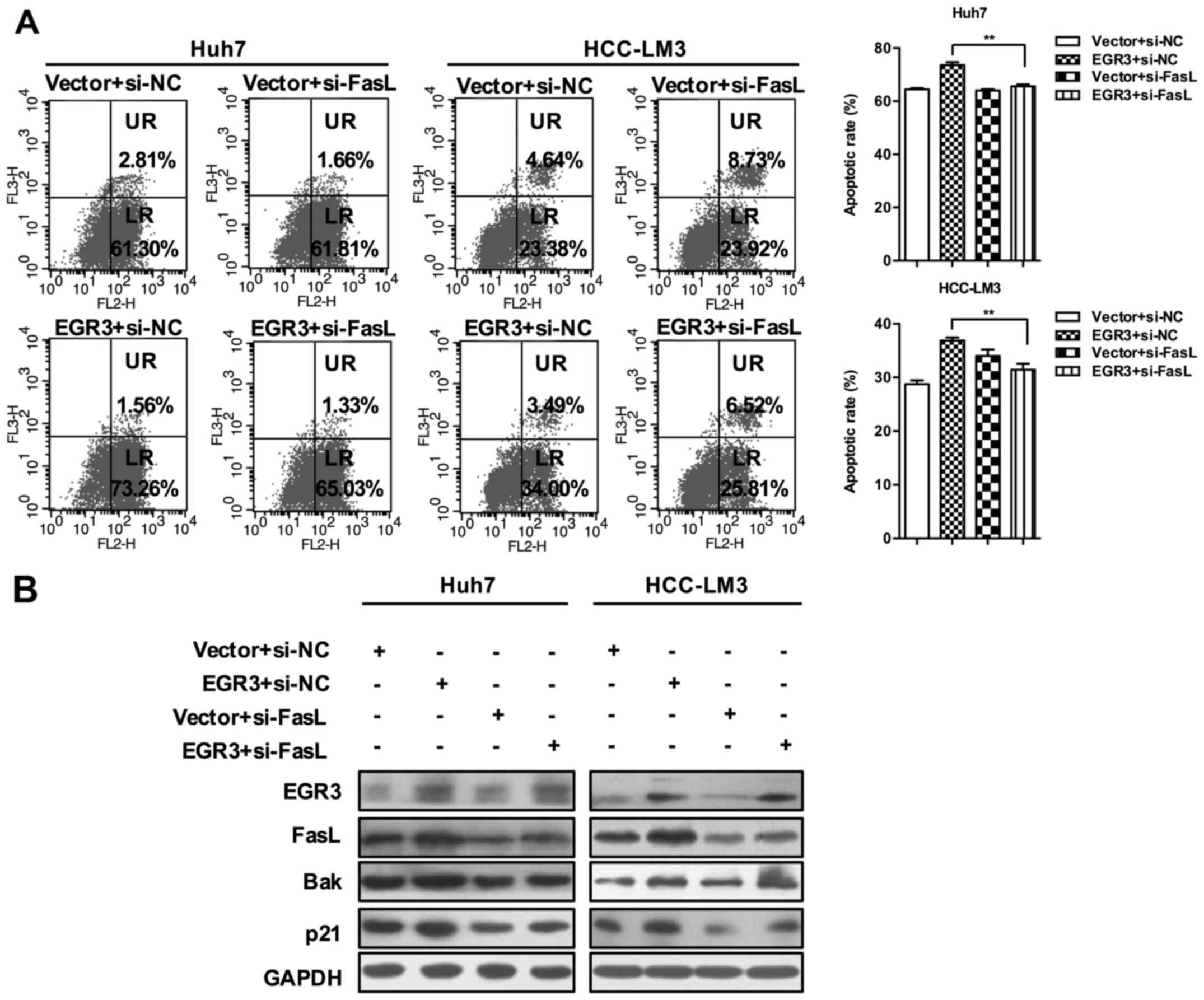|
1
|
Yang JD and Roberts LR: Hepatocellular
carcinoma: A global view. Nat Rev Gastroenterol Hepatol. 7:448–458.
2010. View Article : Google Scholar : PubMed/NCBI
|
|
2
|
Huo X, Zhang Q, Liu AM, Tang C, Gong Y,
Bian J, Luk JM, Xu Z and Chen J: Overexpression of Yes-associated
protein confers doxorubicin resistance in hepatocellullar
carcinoma. Oncol Rep. 29:840–846. 2013.
|
|
3
|
Tang ZY: Hepatocellular carcinoma - cause,
treatment and metastasis. World J Gastroenterol. 7:445–454. 2001.
View Article : Google Scholar
|
|
4
|
Wu CS, Yen CJ, Chou RH, Li ST, Huang WC,
Ren CT, Wu CY and Yu YL: Cancer-associated carbohydrate antigens as
potential biomarkers for hepatocellular carcinoma. PLoS One.
7:e394662012. View Article : Google Scholar : PubMed/NCBI
|
|
5
|
Gómez-Martín D, Díaz-Zamudio M,
Galindo-Campos M and Alcocer-Varela J: Early growth response
transcription factors and the modulation of immune response:
Implications towards autoimmunity. Autoimmun Rev. 9:454–458. 2010.
View Article : Google Scholar
|
|
6
|
Thiel G and Cibelli G: Regulation of life
and death by the zinc finger transcription factor Egr-1. J Cell
Physiol. 193:287–292. 2002. View Article : Google Scholar : PubMed/NCBI
|
|
7
|
Kim HJ, Hong JM, Yoon KA, Kim N, Cho DW,
Choi JY, Lee IK and Kim SY: Early growth response 2 negatively
modulates osteoclast differentiation through upregulation of Id
helix-loop-helix proteins. Bone. 51:643–650. 2012. View Article : Google Scholar : PubMed/NCBI
|
|
8
|
Bhattacharyya S, Fang F, Tourtellotte W
and Varga J: Egr-1: New conductor for the tissue repair orchestra
directs harmony (regeneration) or cacophony (fibrosis). J Pathol.
229:286–297. 2013. View Article : Google Scholar
|
|
9
|
Bolli N, Avet-Loiseau H, Wedge DC, Van Loo
P, Alexandrov LB, Martincorena I, Dawson KJ, Iorio F, Nik-Zainal S,
Bignell GR, et al: Heterogeneity of genomic evolution and
mutational profiles in multiple myeloma. Nat Commun. 5:29972014.
View Article : Google Scholar : PubMed/NCBI
|
|
10
|
Stoddart A, Fernald AA, Wang J, Davis EM,
Karrison T, Anastasi J and Le Beau MM: Haploinsufficiency of
del(5q) genes, Egr1 and Apc, cooperate with Tp53 loss to induce
acute myeloid leukemia in mice. Blood. 123:1069–1078. 2014.
View Article : Google Scholar : PubMed/NCBI
|
|
11
|
Boone DN, Qi Y, Li Z and Hann SR: Egr1
mediates p53-independent c-Myc-induced apoptosis via a noncanonical
ARF-dependent transcriptional mechanism. Proc Natl Acad Sci USA.
108:632–637. 2011. View Article : Google Scholar
|
|
12
|
Wirth M, Stojanovic N, Christian J, Paul
MC, Stauber RH, Schmid RM, Häcker G, Krämer OH, Saur D and
Schneider G: MYC and EGR1 synergize to trigger tumor cell death by
controlling NOXA and BIM transcription upon treatment with the
proteasome inhibitor bortezomib. Nucleic Acids Res. 42:10433–10447.
2014. View Article : Google Scholar : PubMed/NCBI
|
|
13
|
Nishimura Y, Takizawa R, Koike S,
Kinoshita A, Satomura Y, Kawasaki S, Yamasue H, Tochigi M, Kakiuchi
C, Sasaki T, et al: Association of decreased prefrontal hemodynamic
response during a verbal fluency task with EGR3 gene polymorphism
in patients with schizophrenia and in healthy individuals.
Neuroimage. 85:527–534. 2014. View Article : Google Scholar
|
|
14
|
Safford M, Collins S, Lutz MA, Allen A,
Huang CT, Kowalski J, Blackford A, Horton MR, Drake C, Schwartz RH,
et al: Egr-2 and Egr-3 are negative regulators of T cell
activation. Nat Immunol. 6:472–480. 2005. View Article : Google Scholar : PubMed/NCBI
|
|
15
|
Li S, Miao T, Sebastian M, Bhullar P,
Ghaffari E, Liu M, Symonds AL and Wang P: The transcription factors
Egr2 and Egr3 are essential for the control of inflammation and
antigen-induced proliferation of B and T cells. Immunity.
37:685–696. 2012. View Article : Google Scholar : PubMed/NCBI
|
|
16
|
Liu D, Evans I, Britton G and Zachary I:
The zinc-finger transcription factor, early growth response 3,
mediates VEGF-induced angiogenesis. Oncogene. 27:2989–2998. 2008.
View Article : Google Scholar
|
|
17
|
Baron VT, Pio R, Jia Z and Mercola D:
Early growth response 3 regulates genes of inflammation and
directly activates IL6 and IL8 expression in prostate cancer. Br J
Cancer. 112:755–764. 2015. View Article : Google Scholar : PubMed/NCBI
|
|
18
|
Suzuki T, Inoue A, Miki Y, Moriya T,
Akahira J, Ishida T, Hirakawa H, Yamaguchi Y, Hayashi S and Sasano
H: Early growth responsive gene 3 in human breast carcinoma: A
regulator of estrogen-meditated invasion and a potent prognostic
factor. Endocr Relat Cancer. 14:279–292. 2007. View Article : Google Scholar : PubMed/NCBI
|
|
19
|
Pio R, Jia Z, Baron VT and Mercola D; UCI
NCI SPECS Consortium of the Strategic Partners for the Evaluation
of Cancer Signatures-Prostate Cancer: Early growth response 3
(Egr3) is highly overexpressed in non-relapsing prostate cancer but
not in relapsing prostate cancer. PLoS One. 8:e540962013.
View Article : Google Scholar
|
|
20
|
Salotti J, Sakchaisri K, Tourtellotte WG
and Johnson PF: An Arf-Egr-C/EBPβ pathway linked to ras-induced
senescence and cancer. Mol Cell Biol. 35:866–883. 2015. View Article : Google Scholar :
|
|
21
|
Cheng H, Hao S, Liu Y, Pang Y, Ma S, Dong
F, Xu J, Zheng G, Li S, Yuan W, et al: Leukemic marrow infiltration
reveals a novel role for Egr3 as a potent inhibitor of normal
hematopoietic stem cell proliferation. Blood. 126:1302–1313. 2015.
View Article : Google Scholar : PubMed/NCBI
|
|
22
|
Liao F, Ji MY, Shen L, Qiu S, Guo XF and
Dong WG: Decreased EGR3 expression is related to poor prognosis in
patients with gastric cancer. J Mol Histol. 44:463–468. 2013.
View Article : Google Scholar : PubMed/NCBI
|
|
23
|
Suda T, Takahashi T, Golstein P and Nagata
S: Molecular cloning and expression of the Fas ligand, a novel
member of the tumor necrosis factor family. Cell. 75:1169–1178.
1993. View Article : Google Scholar : PubMed/NCBI
|
|
24
|
Lavrik IN and Krammer PH: Regulation of
CD95/Fas signaling at the DISC. Cell Death Differ. 19:36–41. 2012.
View Article : Google Scholar :
|
|
25
|
Kober AM, Legewie S, Pforr C, Fricker N,
Eils R, Krammer PH and Lavrik IN: Caspase-8 activity has an
essential role in CD95/Fas-mediated MAPK activation. Cell Death
Dis. 2:e2122011. View Article : Google Scholar : PubMed/NCBI
|
|
26
|
Suda T, Okazaki T, Naito Y, Yokota T, Arai
N, Ozaki S, Nakao K and Nagata S: Expression of the Fas ligand in
cells of T cell lineage. J Immunol. 154:3806–3813. 1995.PubMed/NCBI
|
|
27
|
Montel AH, Bochan MR, Hobbs JA, Lynch DH
and Brahmi Z: Fas involvement in cytotoxicity mediated by human NK
cells. Cell Immunol. 166:236–246. 1995. View Article : Google Scholar : PubMed/NCBI
|
|
28
|
Griffith TS, Brunner T, Fletcher SM, Green
DR and Ferguson TA: Fas ligand-induced apoptosis as a mechanism of
immune privilege. Science. 270:1189–1192. 1995. View Article : Google Scholar : PubMed/NCBI
|
|
29
|
Uckan D, Steele A, Cherry, Wang BY,
Chamizo W, Koutsonikolis A, Gilbert-Barness E and Good RA:
Trophoblasts express Fas ligand: A proposed mechanism for immune
privilege in placenta and maternal invasion. Mol Hum Reprod.
3:655–662. 1997. View Article : Google Scholar : PubMed/NCBI
|
|
30
|
Reichmann E: The biological role of the
Fas/FasL system during tumor formation and progression. Semin
Cancer Biol. 12:309–315. 2002. View Article : Google Scholar : PubMed/NCBI
|
|
31
|
Zheng SY, Li DC, Zhang ZD, Zhao J and Ge
JF: Adenovirus-mediated FasL gene transfer into human gastric
carcinoma. World J Gastroenterol. 11:3446–3450. 2005. View Article : Google Scholar : PubMed/NCBI
|
|
32
|
Siena L, Pace E, Ferraro M, Di Sano C,
Melis M, Profita M, Spatafora M and Gjomarkaj M: Gemcitabine
sensitizes lung cancer cells to Fas/FasL system-mediated killing.
Immunology. 141:242–255. 2014. View Article : Google Scholar :
|
|
33
|
Bianco SR, Sun J, Fosmire SP, Hance K,
Padilla ML, Ritt MG, Getzy DM, Duke RC, Withrow SJ, Lana S, et al:
Enhancing anti-melanoma immune responses through apoptosis. Cancer
Gene Ther. 10:726–736. 2003. View Article : Google Scholar : PubMed/NCBI
|
|
34
|
Kavurma MM and Khachigian LM: Signaling
and transcriptional control of Fas ligand gene expression. Cell
Death Differ. 10:36–44. 2003. View Article : Google Scholar : PubMed/NCBI
|
|
35
|
Mittelstadt PR and Ashwell JD: Cyclosporin
A-sensitive transcription factor Egr-3 regulates Fas ligand
expression. Mol Cell Biol. 18:3744–3751. 1998. View Article : Google Scholar : PubMed/NCBI
|
|
36
|
Inoue A, Omoto Y, Yamaguchi Y, Kiyama R
and Hayashi SI: Transcription factor EGR3 is involved in the
estrogen-signaling pathway in breast cancer cells. J Mol
Endocrinol. 32:649–661. 2004. View Article : Google Scholar : PubMed/NCBI
|
|
37
|
Lee JS and Thorgeirsson SS: Genome-scale
profiling of gene expression in hepatocellular carcinoma:
Classification, survival prediction, and identification of
therapeutic targets. Gastroenterology. 127(Suppl 1): S51–S55. 2004.
View Article : Google Scholar : PubMed/NCBI
|
|
38
|
Thorgeirsson SS, Lee JS and Grisham JW:
Molecular prognostication of liver cancer: End of the beginning. J
Hepatol. 44:798–805. 2006. View Article : Google Scholar : PubMed/NCBI
|
|
39
|
Tang D, Lotze MT, Kang R and Zeh HJ:
Apoptosis promotes early tumorigenesis. Oncogene. 30:1851–1854.
2011. View Article : Google Scholar
|
|
40
|
Wang WZ, Li L, Liu MY, Jin XB, Mao JW, Pu
QH, Meng MJ, Chen XG and Zhu JY: Curcumin induces FasL-related
apoptosis through p38 activation in human hepatocellular carcinoma
Huh7 cells. Life Sci. 92:352–358. 2013. View Article : Google Scholar : PubMed/NCBI
|
|
41
|
Nakamura M, Nagano H, Sakon M, Yamamoto T,
Ota H, Wada H, Damdinsuren B, Noda T, Marubashi S, Miyamoto A, et
al: Role of the Fas/FasL pathway in combination therapy with
interferon-alpha and fluorouracil against hepatocellular carcinoma
in vitro. J Hepatol. 46:77–88. 2007. View Article : Google Scholar
|
|
42
|
El Ojeimy S, McKillop JC, El-Zawahry AM,
Holman DH, Liu X, Schwartz DA, Day TA, Dong JY and Norris JS: FasL
gene therapy: A new therapeutic modality for head and neck cancer.
Cancer Gene Ther. 13:739–745. 2006. View Article : Google Scholar
|
|
43
|
Abbas T and Dutta A: p21 in cancer:
Intricate networks and multiple activities. Nat Rev Cancer.
9:400–414. 2009. View Article : Google Scholar : PubMed/NCBI
|
|
44
|
Westphal D, Dewson G, Czabotar PE and
Kluck RM: Molecular biology of Bax and Bak activation and action.
Biochim Biophys Acta. 1813:521–531. 2011. View Article : Google Scholar : PubMed/NCBI
|
|
45
|
Swindall AF and Bellis SL: Sialylation of
the Fas death receptor by ST6Gal-I provides protection against
Fas-mediated apoptosis in colon carcinoma cells. J Biol Chem.
286:22982–22990. 2011. View Article : Google Scholar : PubMed/NCBI
|
|
46
|
Yang X, Khosravi-Far R, Chang HY and
Baltimore D: Daxx, a novel Fas-binding protein that activates JNK
and apoptosis. Cell. 89:1067–1076. 1997. View Article : Google Scholar : PubMed/NCBI
|
|
47
|
Juo P, Kuo CJ, Reynolds SE, Konz RF,
Raingeaud J, Davis RJ, Biemann HP and Blenis J: Fas activation of
the p38 mitogen-activated protein kinase signalling pathway
requires ICE/CED-3 family proteases. Mol Cell Biol. 17:24–35. 1997.
View Article : Google Scholar : PubMed/NCBI
|
|
48
|
Lee KB, Kim KR, Huh TL and Lee YM: Proton
induces apoptosis of hypoxic tumor cells by the p53-dependent and
p38/JNK MAPK signaling pathways. Int J Oncol. 33:1247–1256.
2008.PubMed/NCBI
|
|
49
|
Maiuri MC, Galluzzi L, Morselli E, Kepp O,
Malik SA and Kroemer G: Autophagy regulation by p53. Curr Opin Cell
Biol. 22:181–185. 2010. View Article : Google Scholar : PubMed/NCBI
|
|
50
|
Gartel AL and Tyner AL: The role of the
cyclin-dependent kinase inhibitor p21 in apoptosis. Mol Cancer
Ther. 1:639–649. 2002.PubMed/NCBI
|
|
51
|
Graupner V, Alexander E, Overkamp T,
Rothfuss O, De Laurenzi V, Gillissen BF, Daniel PT, Schulze-Osthoff
K and Essmann F: Differential regulation of the proapoptotic
multi-domain protein Bak by p53 and p73 at the promoter level Cell
Death Differ. 18:1130–1139. 2011.
|















